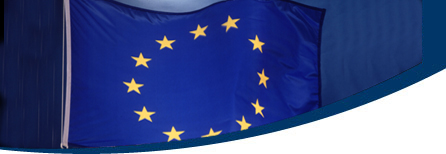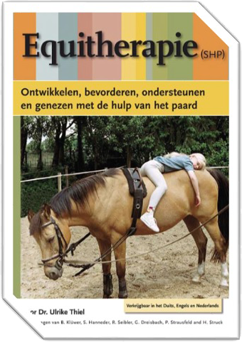
EU-project-SHP -afgesloten

Finishing Report of SHP:
A European qualification framework for practice and training in animal mediated
assistance and therapy
010-1-FR1-LEO04-14357 2
Partners
- Fitram France
- Handhippo Belgium
- Stowarzyszenie Strapate Ranczo Poland
- Slovenska hipoterapeuticka spolocnost Slovakia
- Förderkreis Therapeutisches Reiten e.V. Germany
- SHP-E(Nl) Nederlandse Stichting Helpen met Paarden – Equitherapie
Silent (associated) partner
-
Fundacja Hippotherapeutica Poland
Find here links to
the final report an assesment of the NL National Agency
and a lot op products and documentation of this project
Notes of the partner meetings:
Notes of the working group Data Collection leaded by SHP
- Meeting notes Group Data Collection 1st meeting Belgium
- Presentation meeting Data Collection in Paris 2
-
Lecture of the Dutch stakeholder at the AAIZOO evening on (van kwaliteit naar vergoeding)
-
Information about The Netherlands Slides (Power Point presentation at Friday 7th during dinner)Presentation about The Netherlands presented at the 4th meeting of partners in the Netherlands
-
Presentation The Tale of the Colour of Gold the demonstration of horse and children at the beginning of the 4th partner meeting
-
Presentation of the SHP system for training and quality insurance for Equitherapy presented at the workshop at the 4th partner meeting
SHP asked the partners to adapt the presented folder before publishing at the 5th partner meeting (see final report):
-
SHP was not approving the produced folder because of bad and not equal representation of the practices
in different countries and a lot of safety problems shown in the pictures. We carried out a
survey in the Netherlands to argue evidence based arguments and wanted to present and discuss them with the partners at the 5th meeting in order to improve the folder together. (see final report and report of a student) We found that the folder did not represent at all the situation and quality and safety measures handled by our organization in the Netherlands. Finally the folder was published without our permission. So we asked to remove our logo and the only picture of SHP in it before publishing and distributing. Partners agreed, but unfortunately still the folder seems to be published with our logo and not permitted foto in it and photoraphs of unknown persons under the name of NL, whch are not representing the practice of working of Equitherpists SHP at all. We consider dissimination of this folder as very much misleading and damaging for the reputation of SHP and its quality standards, -
Not approved folder and more information see more detaileed on Bad PR for AMAT
Photo's and description of meetings an activities at the homepage of SHP
Find some links to
-
activities of SHP for students and meetings http://en.equitherapie.org/page/Reports-open-to-the-LDV-group
-
Workshops at the opening trainings centre open for partnersOpening training centre SHP and 2 days symposium for Equitherapists and ridersActivity in Netherlands 22.5.2011Fotoshow of this symposium Opening Cursuscentrum
-
The Tale of the Colour of Gold the demonstration pf horse and childresn at the beginning of the meeting
-
Information about The Netherlands Slides (Power Point presentation at Friday 7th during dinner)
-
Information about the Netherlands(text of the presentation as pdf document)
-
Report Activity in Netherland 19.-21.8.2011photos of this event FATP 2011
-
Information about the Netherlands (handouts power point presentation)
Workshop at the 4th meeting http://en.equitherapie.org/page/SHP-Workshop-at-the-4th-meetin
Submission forms and questionnaires developed for this project:
Link to the submission forms for the survey carried out for this project
-
Questionnaire: Practice and organizations in the field of AMAT english basic word version of national questionnaires suvey 2
Questionnaires for survey "State of the Art in the partner countries"
-
Questionnaire English version (word) as pdf english basic word version of national questionnaires suvey 2
-
Photos of the LDV project
-
Meetings of the LDV project
-
Students taking part in the SHP equitherapists education and examinations
Klick through to the photopages
|
4 th LDV Meeting of partners at the HippoCampus trainings centre of SHP-E(NL) |
|
|
SHP organized a 1 day workshop for partners and students
at the HippoCampus Training centre 7th october 2011
Aim: Introduction to the working methods of the SHP and training Equitherapie (SHP) and the certification system for quality assurance. Initial discussion with other colleagues (from the countries: France, Poland, Slovakia, Belgium Germany) about the differences and similarities of training in the expectation of our organizations to develop the EU framework.
Partners attending this workshop where:
France, Belgium, Germany, the Netherlands (with students), Slovakia (with student)
|
|
During the first dinner of the meeting Ulrike THiel presented a slide show over the Netherlands made by Annet and Ulrike to give our partners an introduction to their inviting partner country |
Link to the submission forms for the survey carried out for this project
-
Questionnaire: Practice and organizations in the field of AMAT english basic word version of national questionnaires suvey 2
Questionnaires for survey "State of the Art in the partner countries"
-
Questionnaire English version (word) as pdf english basic word version of national questionnaires suvey 2
The Dutch LDV team: http://en.equitherapie.org/page/Dutch-LDV-Team-Page





